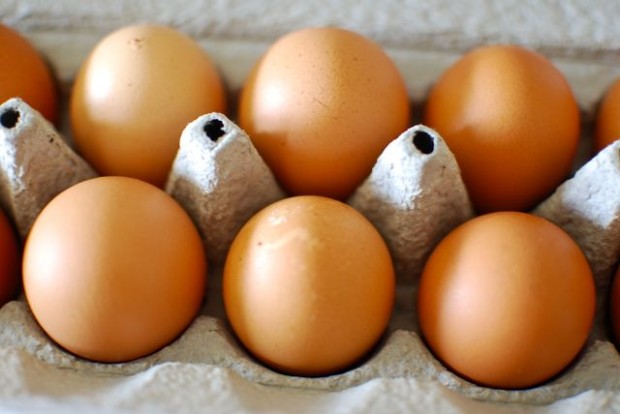With the recent massive egg recall, it’s more important than ever to make sure the eggs you’re buying are safe, healthy, and promote a sustainable food system. But egg labels can be confusing…I mean, who knows the difference between “free range” and “cage free?” Here’s a quick guide to the terms you need to know:
- Organic: Chickens must be cage free with some outdoor access (amount not defined), cannot be given antibiotics, and their food must be organic and vegetarian. The USDA Organic seal is the only official egg label claim that’s backed by federal regulations.
- Free Range: Chickens are out of cages, and might roam freely around a farmyard for at least part of the day, but there is no regulation in the U.S. about the amount or quality of outdoor access. There are no restrictions on what the birds can be fed.
- Cage Free: Just because these chickens are not technically in cages does not mean they are free to roam around or even have access to the outdoors. In fact, they are likely to be tightly packed into a shed that’s so crowded it’s almost like being in a cage.
- Certified Humane: Chickens are out of cages inside barns or warehouses, but may not have access to the outdoors. There are regulations to ensure the chickens can perform natural behaviors and to limit the density of birds. Here’s some more info on Certified Humane eggs.
- Animal Welfare Approved: This term is given to independent family farmers with flocks of up to 500 chickens who are free to spend unlimited time outside on pesticide-free pasture, cannot have their beaks cut (beak cutting is allowed in ALL the previous definitions and is very common). Eggs from these farms are most commonly found at specialty/health food stores and farmer’s markets.
The following terms are unregulated and therefore mean nothing:
Natural
Naturally Raised
No Hormones
No Antibiotics
Cage-Free
Beware of this term:
“United Egg Producers Certified” just means that a company gives their caged hens food and water. Almost all factory farms fall under this term, so it has no positive meaning.
So Which Eggs Should You Buy?
Look for these terms:
Animal Welfare Approved
Certified Humane
Pasture-Raised
Organic, Pasture-Raised
Organic, Free-Range (label says both)
Eggs from a farmer you know and like!
Recommended Brands And Where to Find Them
Egg brands will vary depending on where you live. In general, Trader Joe’s, Whole Foods, Wild Oats, co-ops, natural & health food stores, and farmer’s markets all offer organic, free range eggs from trusted sources. Just make sure you read labels carefully before you buy. Some suggestions:
Organic Valley (Whole Foods and some conventional markets, ~ $4.99/dozen)
Vital Farms (Whole Foods, some natural grocers, ~$5.99/dozen
Trader Joe’s Organic Free Range (Trader Joe’s, $3.99)
Chino Valley Ranchers Organic (Whole Foods, ~$4.29)
Whole Foods Organic Free Range (Whole Foods, ~$3.99)
A local brand you trust (varies from $3.99-6.99/dozen)






6 Comments
Deana
August 24, 2010 at 9:18 pmThere is no comparison when it comes to taste with homegrown eggs. The yolks are golden orange unlike the dull pale yolks from conventional eggs. Luckily for us my mom in law has chickens so we get delicious eggs from her.
Bob
February 11, 2018 at 7:35 amI am sick of going to the grocery store trying figure out which eggs to purchase. I am not happy each time I crack an egg open it has all this white crap inside of it, which to me affects the look and taste of the egg. What kind of eggs and where can I buy them that are clean yellow yolk eggs with nothing else inside of them that taste good. I understand feed and the way chicken are raised affects the eggs and how they look and taste. I want real eggs YELLOW YOLKS that taste like eggs use too! Thank You if you can help.
Amelia Winslow
February 20, 2018 at 11:18 amHi Bob,
I’m not sure what contributes to the white tinge inside a freshly cracked egg. I do know that age and how much the egg has been jiggled can affect quality. Re: egg yolk color, it largely depends on what the hens eat, and whether they can forage for insects, worms, etc which boost omega-3 and vitamin content naturally. My own pick is Vital Farms, either their organic pasture-raised or the Backyard Eggs (also by Vital Farms – not organic but more widely available).